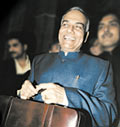Political farce over accounting
By Kiron Kasbekar | 01 Mar 2002
 The other culprit is the political process. All political parties, those in government and the ones in the opposition have worked to politicise the budget process so much that it has become a public spectacle rather than the hard-headed public accounting process it should be.
The other culprit is the political process. All political parties, those in government and the ones in the opposition have worked to politicise the budget process so much that it has become a public spectacle rather than the hard-headed public accounting process it should be.
Birds of the same feather
In the early 1990s the Congress introduced economic reforms, then chickened out in the second half of Narasimha Rao’s tenure as prime minister. That was because the opposition, including the Bhartiya Janata Party, the Janata Dal and others screamed that the reforms, including the course corrections sought to be introduced by then finance minister Manmohan Singh, were anti-people.
 When these opposition parties stitched together their own coalition governments, they did more or less the same thing the Congress did. For evidence, go back to P Chidambaram’s budget speech during the Deve Gowda government, or Yashwant Sinha’s speeches for the current BJP-led coalition government. Now Congress representatives like Priya Ranjan Das Munshi are howling that the budget is anti-people, even though Mr Sinha has only said and done what Singh or Chidambaram said or did.
When these opposition parties stitched together their own coalition governments, they did more or less the same thing the Congress did. For evidence, go back to P Chidambaram’s budget speech during the Deve Gowda government, or Yashwant Sinha’s speeches for the current BJP-led coalition government. Now Congress representatives like Priya Ranjan Das Munshi are howling that the budget is anti-people, even though Mr Sinha has only said and done what Singh or Chidambaram said or did.
We also have the likes of Somnath Chatterjee of the Communist Party of India (Marxist), who will rail against the budget irrespective of whether it is a Congress, Janata or BJP government in power. He told TV reporters, "Today’s budget is nothing but a declaration of war on the poor, the middle class, and the farmers." It is inconceivable for Chatterjee that any non-CPI(M) government can do anything for the poor, middle class and farmers – by definition, for him, such a government will be anti-all-these-people.
 But perhaps it has become a habit with him. It’s not difficult to imagine, in the unlikely event that the CPI(M) forms a government in New Delhi and presents a budget, the inveterate Chatterjee talking to reporters outside Parliament denouncing the budget as anti-people. Unless, who knows, he happens to be the person presenting the budget proposals (in which case you could imagine him "commending" the proposals to the house, and then coming out of the house and recommending its scrapping because it is anti-people).
But perhaps it has become a habit with him. It’s not difficult to imagine, in the unlikely event that the CPI(M) forms a government in New Delhi and presents a budget, the inveterate Chatterjee talking to reporters outside Parliament denouncing the budget as anti-people. Unless, who knows, he happens to be the person presenting the budget proposals (in which case you could imagine him "commending" the proposals to the house, and then coming out of the house and recommending its scrapping because it is anti-people).
Righting wrongs
There is a good chance that nearly any budget presented by any political party is likely to do something against ordinary people. For nearly half a century we allowed the government to grow and grow – largely because of the leftist ideology of boosting the public sector at the cost of the private sector.
Since the public sector couldn’t be run effectively or efficiently, the bloated public sector and government machinery could be kept afloat only through increasing doses of taxation of the efficient. That distorted the economy and made Indian business uncompetitive in the world. That meant less jobs, lower incomes, poor consumption of goods and services, resulting further in fewer jobs, lower incomes and poor consumption. This is one wrong that has to be corrected.
The other wrong was the indiscriminate subsidising of every conceivable segment of the population that could result in more votes for the parties in power. Free food, free irrigation water, free electricity, near-free kerosene and LPG, cheap fertilisers, off-take of food grains by the government even as its excessive stocks rotted in open storage spaces. Even free bank loans that people didn’t have to bother to pay back! Somebody had to pay for this mindless profligacy – the ordinary people of this country. This is the other wrong that has to be corrected.
Neither of these policies helped the poor or middle class because they only frayed and damaged the basic fabric of the economy. Because good money was constantly being thrown into a bottomless pit whose only beneficiaries were politicians and bureaucrats from New Delhi to the villages, some rich and middle farmers and some unscrupulous businessmen who used the protection they got from the ill-conceived licensing policies to make super-profits by selling shoddy products and services at high prices to consumers who had no choice but to take what they got.
Separate the budget from politics
Now that we have gone through diverse political regimes, and every government has learned the lessons of what it means to run a government, it is time we learned to disassociate the government’s budgetary process from the political process. Governments, like companies, or households, must have budgets in order to balance incomes and expenses. That process should be reduced to a fiscal process and distanced from policy-making.
So, issues like privatisation, stock market reforms, currency convertibility, revamp of labour laws, allowing private entry into airports, strengthening the rural infrastructure, encouraging food processing industries, and so on, should be de-linked from the budget process.
How can you, you might ask, when the government must allocate funds for these initiatives? Very simply, by announcing these initiatives well in advance of the budget, getting them approved by the cabinet, or parliament if that is required, and then presenting their income-expenditure implications for the next fiscal year in the budget proposals.
Where these policies are launched after the budget, there is always the device of supplementary demands (for mid-year revisions to the budget), which governments have resorted to in any case.
A speeding up of the reform process will mean less government interference and less public investment in areas that are best left to the private sector. That will mean the Union budget will become less and less important to the public because it will have more to do with the planning and accounting of a slimmer government rather than the macro- and micro-planning of the entire economy, which is what past budgets tended to do.
It would be unrealistic to expect this to happen, say next year. But it’s the direction in which we must move.
Other important issues
As for the impact of the latest budget proposals, it’s safe to say they are a mixed bag of tricks. Some people, and industries will gain a bit, some others will lose a bit. But there is nothing earth-shaking in the budget for anybody, notwithstanding what some of the market pundits are saying.
The overall scenario in which the budget proposals have been framed is a difficult one. And nobody except the most inveterate optimists expected anything dramatic.
Whether the economy grows faster next year than in the current year that’s about to end on 31 March 2002 will be determined by a host of other factors, including the health of the world economy, global oil prices, the monsoon, and overall business confidence. More may depend on how the government deals with the revival of communal violence than on things like the increase in LPG prices or the reversion of dividend tax, however unfair it may be.


















